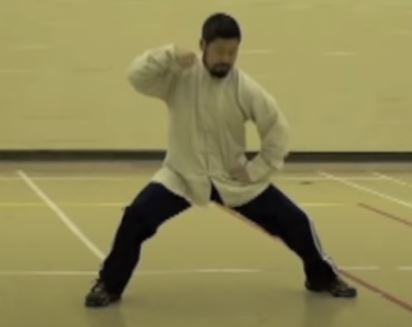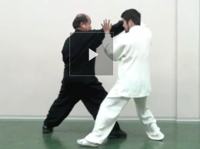Xian (1) Ru (4) Wei (2) Zhu (3) 先入为主
Xian: first, early, before
Ru: enter
Wei: become, be
Zhu: host, master
“One who enters first is the host”. The second part of this idiom is “He who enters later is the guest.” This is a special type of idiom in Chinese. It is called “Xie Hou Yu”. In using it, the speaker leaves out the conclusion. The listener has to fill the gap. This is a clever play of language, however, it also causes confusion or problems when the listener does not have the necessary knowledge to complete the whole idea.
When Richard Nixon went to Beijing to pay an official visit to Chairman Mao in 1972, Mao started the conversation by saying that he was an old monk holding a broken umbrela. The unspoken conclusion of the idiom is “No hair, no sky.” The meaning of the unspoken part is, “For me, I am above all laws, even God.” Nixon’s interpreter did not know this particular idiom. He made a mistake by interpreting the Chairman’s idiom into “I am humbled to meet you.” This small error in interpretation made history.
Other examples of Xie Hou Yu.
- Hit the dog with meatball buns. (You won’t get it back).
- Clay Buddha crossing the river. (You cannot even protect yourself!).
- Bamboo basket fetching water. (You will get nothing).
Let’s go to the second part of this lesson: the relevancy of this idiom to Taiji.
In learning, whatever is introduced to you first becomes the standard for your subsequent learning. This is a nasty and stubborn problem for everyone. The proper learning process should/must involve learning new things and eliminating previous mistakes. This is the ideal situation but in reality, it does not work like that. Xie Ru Wei Zhu is the dominant method of learning. It is the default learning mode. This mode actually overrides the ideal scenario of learning and the elimination of mistakes. Fist of all, when the wrong thing is set as the standard, you won’t learn anything correctly. Secondly, you won’t have the ability to find out the mistakes to eliminate them.
Now you realize that whether you are right or wrong is largely a toss up.
What do we do from here? How can we get rid of this pesty Xian Ru Wei Zhu?
Grandmaster Hong Junsheng offered a few advice:
- Follow the real transmission.
- Do not trust/believe yourself.
- Subject everything to simply tests.
Transmission has to be directly from one person to another. Simple and straight forward. It cannot be that there are one million justifications but no transmission. What should we look for in a transmission? 1. Did the two people in question meet? How long were they together? Were there others present? Is the choreography identical? Are there others in the class who also have identical choreography?
Taijiquan is a physical science. It is not a belief system. Do not trust yourself. Use physical measurements and objective standards. Do not trust your instinct. Do not go with the flow.
Use simple tests. Do not devise complicated tests that involve too many parameters. Many of the parameters are falsely established. Many of the “Taiji Principles” in classics are simply erroneous. For example, the story of Chen Fake’s learning grew from 10 yilus a day to 20 a day, then 40 a day and eventually 100 times a day. Some even claimed that he did Yilu and Cannon Fist a hundred times a day! People quoted these unfounded claims exactly the same way gossip is spread in tabloid papers! I asked Todd Elihu, John Dahms, Dave Dahms and others to complete 100 yilus in a day. They started at 4:30 in the morning and went till past 9:30 at night. They had prepared food ahead of time to save time and did not take lengthy breaks. They were able to do 100, 104 and 110 respectively.
Just imagine that. It is certain that Chen Fake did not practice from 4:30 in the morning till 9:30 at night each day for many years!
LET GO of the precepts, principles, habits, ideals, beliefs and techiques you hold to be dear! Embrace the simple practical method. You will see yourself improve quantumly.



{ 2 comments… read them below or add one }
[quote]Other examples of Xie Hou Yu.
1. Hit the dog with meatball buns. (You won’t get it back).
2. Clay Buddha crossing the river. (You cannot even protect yourself!).
3. Bamboo basket fetching water. (You will get nothing).
[/quote]
These are great!!
[quote]Taijiquan is a physical science. It is not a belief system. Do not trust yourself. Use physical measurements and objective standards. Do not trust your instinct. Do not go with the flow.[/quote]
WoW! I expect a few dragons to fly in the face of this one! We call the tai chi that can only work if you believe in it as tai cheese!
It is so refreshing in the tai chi world to find a rock to stand up on that is not made of cheese.
Mmm. Maybe another example. One student came in, concerned about the sequence of the Yilu. I taught him the required moves, not correcting movements prior to it, in order to keep on the subject. A second student came in late, not knowing what occurred before, and displayed his distain for me not correcting the ‘prior’ movements. He is no longer in the classes, taken away by his own illusion.
It is hard to place the seed of progress in one’s mind when one thinks the so called owned standard is ‘hot’, when it is merely the start of the ability to compare to what is required.